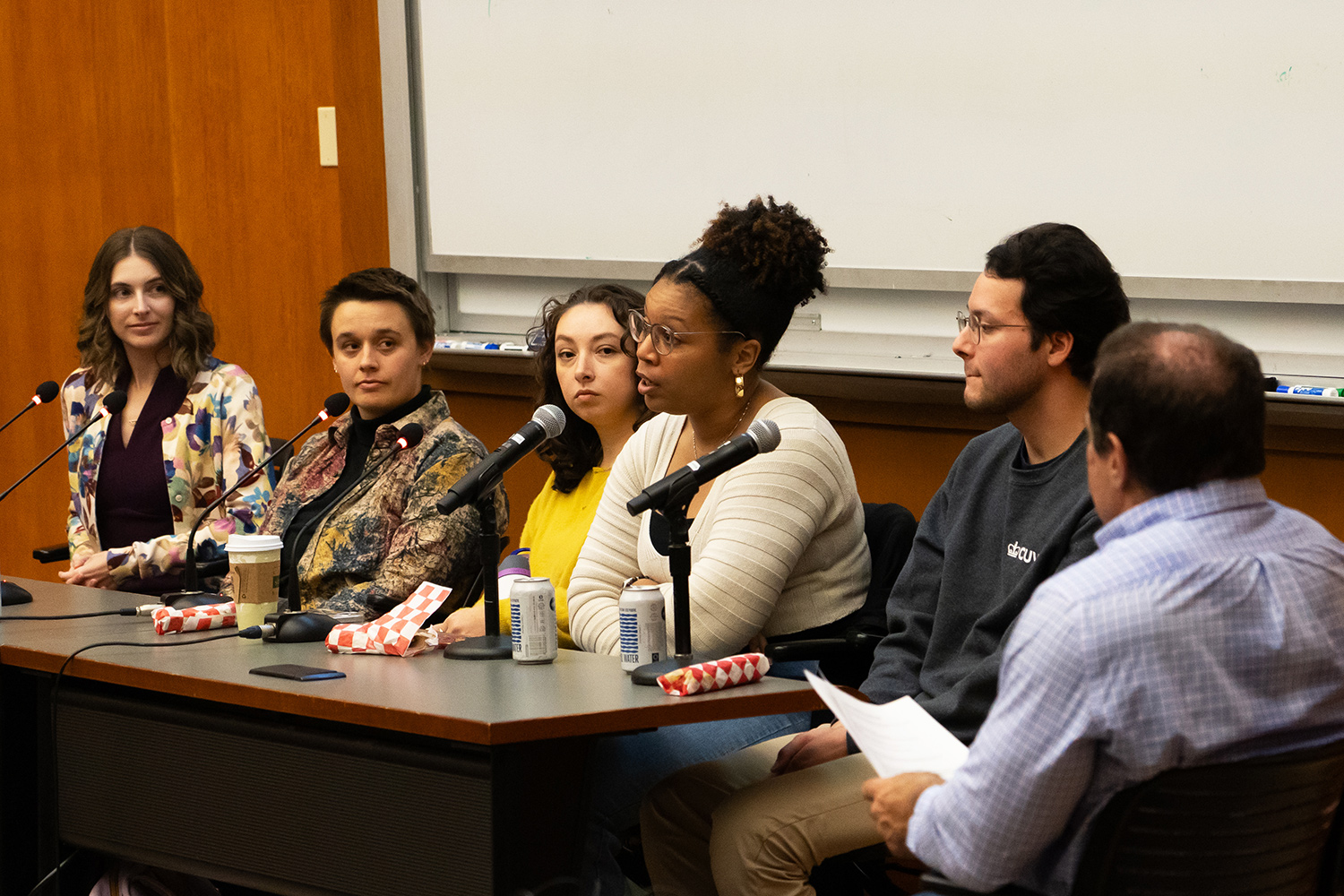
By Andrew Cohen
With the process still fresh in their minds, five UC Berkeley Law 3Ls who secured judicial clerkships recently shared valuable tips with fellow students who may pursue the same path.
A lunchtime program featured 3Ls Nikki Baim (who will clerk for the U.S. Seventh Circuit Court of Appeals Staff Attorney’s Office), Cat Chervenak (Alaska Supreme Court Justice Jennifer Henderson), Lorena Ortega Guerrero (U.S. Eastern District of New York Judge Sanket Bulsara, then U.S. Sixth Circuit Court of Appeals Judge Rachel Bloomekatz), Kayvon Seif-Naraghi (U.S. Central District of California Judge George Wu), and Alexis Tatum (U.S. Northern District of Texas Judge David Godbey).
“No one goes about applying for a clerkship alone, whether it is asking for faculty to write letters of recommendation or seeking information and advice from peers who have been in their shoes,” said UC Berkeley Law Director of Judicial Clerkships Anna Han. “Our clerkship programming is designed to support applicants through the entire process, and this particular panel emphasized that there are different strategies to getting a clerkship and that there is a large variety of clerkships out there.”
Discussing how they navigated the competitive application process, the students touched on key factors from location and ideology to cover letters and interviews.
“Make sure you’ve looked into the geographic area and the court you’re applying to if you’re not from that jurisdiction,” Tatum said. “It may be a court where the docket is heavy on intellectual property and patent issues, as the Eastern District of Texas is, and if you’re aware of those things it will help your cause with the judge.”
Putting in the research
Panelists explained that some judges have a more evident ideological bent than others, and touted the importance of learning about their decision-making tendencies. They said that several blogs keep track of what judges say and do, Bloomberg Law maintains a robust chart of judges’ history in their rulings, and UC Berkeley Law faculty, staff, and alumni are enormously helpful in sussing out useful information.
The students also recommended maintaining a thick skin during the process, explaining that competition for clerkship spots can be daunting. Ortega Guerrero noted that some judges fill their clerkship positions the same day applications open, Tatum said she got two interviews after applying to over 30 judges, and Seif-Naraghi raised the potential expense of flying to an interview with a faraway judge.
“You should do as much research on judges as possible before applying to ensure you are a good fit. But know that you might end up deep diving into a judge and never even get a chance to apply or never hear back from them,” Ortega Guerrero said. “The real work begins when you get an interview. Interviews are important to ensure compatibility, so come prepared to share why you think you would be a good fit.”
The students hailed how UC Berkeley Law’s Career Development Office and Han provide abundant resources to keep applicants closely informed. That includes a database listing where alums have clerked, and a roster of alums who help applicants with mock interviews.
“I definitely made use of the network. There’s a spreadsheet of all the alumni that have clerked, and whenever I got an interview I would just go on there and find somebody that was a somewhat recent grad and then email them,” Seif-Naraghi said. “Every single time they responded. I think people like that who have clerked from Berkeley use this network themselves, and they’re just really willing to give back. So don’t be scared. They’re really nice and they always say yes.”
Writing samples and recommendation letters
Given the importance and prevalence of writing in clerkships, writing samples were another hot topic. The future clerks recommended tailoring them strategically if possible, be it writing about an area of law that the judge’s court frequently deals with or focusing on a federal issue if applying for a federal clerkship.
Tatum wrote hers from the perspective of a judge, Ortega Guerrero’s came from summer work where she got substantive feedback from her supervisor, and Seif-Naraghi advised showing complexity in the content.
The panelists also discussed how many UC Berkeley Law faculty members willingly provide advice on writing samples and where to apply, have meaningful connections with judges, and even make helpful phone calls to those for whom students want to clerk.
Chervenak asked professors with whom she had the strongest relationships for recommendation letters — those she had worked with on clinical projects, performed research, or taken multiple courses.
“I asked the professors I thought knew me the best,” Chervenak said. “Ideally, you want to have a good connection with them. And it is important to let them know as early as possible that you’re applying to clerkships and would appreciate their recommendation.”
Han said she “wanted students to walk away from this program with a realistic understanding that clerkship applications take work, but also with more confidence about their individual approaches, because there really is not a one-size-fits-all method of getting a clerkship.”
